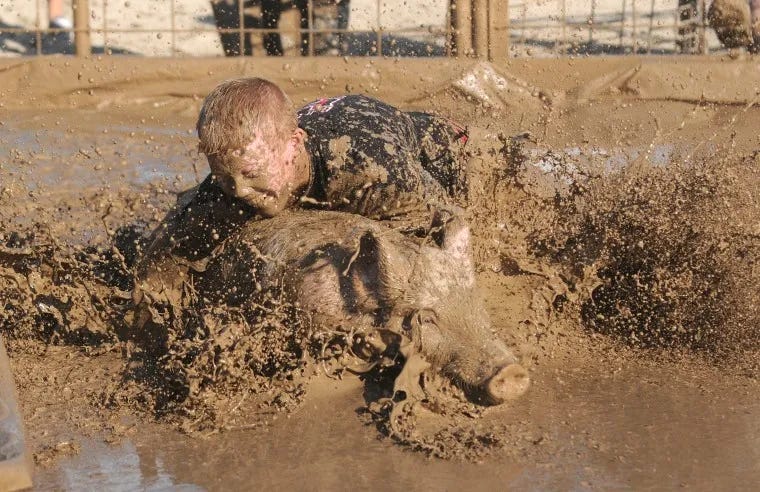Never Wrestle with a Pig
It is not worth your breath to argue with an idiot. Doing so only gives their views an air of legitimacy
“Never wrestle with a pig. You both get dirty, and the pig likes it.”
– Mark Twain
The quote from Mark Twain vividly captures a simple truth: there are times in life when it is better to walk away from an argument before you inadvertently legitimize someone’s delusions. When you spend time grappling with those who thrive in the mud of immoral or destructive behavior, you risk covering yourself with mud as well—and, worse, giving them exactly what they crave.
In many cases, our sense of moral duty can compel us to try changing the hearts of people who seem to have fallen prey to harmful conduct or beliefs. It can feel like a noble cause to persistently show them the errors of their ways, especially if we are committed to seeking goodness and justice. I know I have certainly tried in the past, before I learned this lesson.
Yet from a Stoic perspective, virtue is considered the only non-negotiable “good” and should not be cheapened by arguing with individuals who refuse to recognize fundamental moral truths. For Stoics like Epictetus, discourse is only fruitful among those who seek wisdom in earnest. If a person has rejected the very underpinnings of honorable conduct, then to spend endless hours in debate is to risk appearing as though there is indeed a “side” worth entertaining when, in reality, no such side exists.
The act of trying to reason with the incorrigible grants them an unwarranted platform, suggesting their behavior might be debatable rather than unequivocally wrong. I see this all too often in debates with progressives on abortion, DEI, climate hysteria, etc. There is no “there” there in their arguments, and to even argue with them about their idiocy is to give the appearance that they actually have an argument. They don’t.
This principle of disengagement is not an invitation to complacency. It is, in fact, the opposite. When we refuse to dignify evil behavior with endless discussion, we leave ourselves free to counter it more effectively. Instead of wrestling in the mud, we can focus on more constructive means of opposing their views—legal efforts, civic engagement, or community-building—without wasting time trying to convince them of the errors of their thinking.
Another powerful strategy is to let our own lives serve as an example. Rather than trying to lecture them out of their misdeeds, we become living proof that integrity, empathy, and justice are not only possible but deeply rewarding. When we model the virtues that evildoers lack—rational thought, justice, temperance, courage—we stand as a beacon to the darkness they live in. By steadfastly refusing to mire ourselves in their tactics or to treat their position as rational, we undermine their power at its roots.
Ultimately, the lesson in Mark Twain’s quip becomes clear: lose yourself in futile debates, and you will find you have legitimized something that did not deserve serious consideration in the first place. There comes a time to stop trying to change minds that have willed themselves shut. Instead, we should oppose evil directly and, most importantly, show a better way through our own conduct. This does not imply running from conflicts—it means instead of talking with those who are evil or deluded, take action to fight back against the harm they have caused or intend.
In other words, don’t argue with idiots, or if you are tempted to do so online, don’t feed the trolls!


